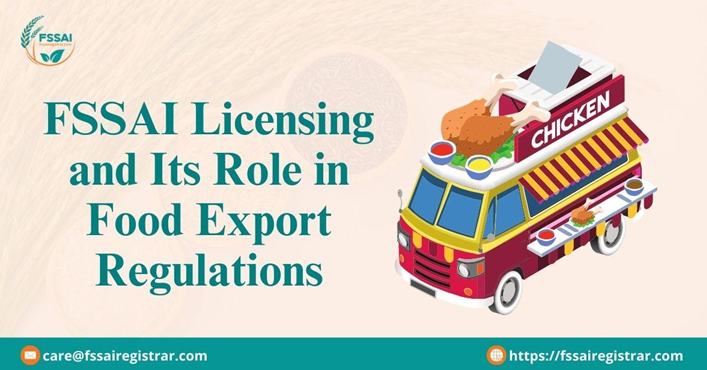FSSAI Licensing and Its Role in Food Export Regulations

Introduction
The Food Safety and Standards Authority of India (FSSAI) plays a pivotal role in ensuring the safety and quality of food products within the country. One of its crucial functions is regulating food exports to maintain high standards and protect consumer health globally. This article delves into the significance of the FSSAI license in the context of food export regulations, outlining the essential steps and benefits for exporters.
Understanding FSSAI Licensing
What is FSSAI Licensing?
FSSAI licensing is a mandatory requirement for food businesses operating in India, including those involved in the export of food products. It ensures that food products meet the safety and quality standards set by the FSSAI, thereby making them fit for consumption.
Types of FSSAI Licenses
- Basic FSSAI Registration: For small-scale food businesses with an annual turnover of up to INR 12 lakhs.
- State FSSAI License: For medium-sized food businesses with an annual turnover between INR 12 lakhs and INR 20 crores.
- Central FSSAI License: For large-scale food businesses with an annual turnover exceeding INR 20 crores or involved in food import/export.
Role of FSSAI in Food Export Regulations
Ensuring Compliance with International Standards
FSSAI works in conjunction with international food safety standards to ensure that exported food products are safe and of high quality. Compliance with FSSAI regulations helps Indian food exporters meet the stringent requirements of global markets, thereby enhancing the credibility of Indian food products.
Certification and Inspection
FSSAI provides necessary certifications and conducts regular inspections to ensure that food products intended for export adhere to the prescribed safety and quality standards. This includes verifying the ingredients, manufacturing processes, packaging, and labeling of food products.
Facilitating Smooth Trade
By obtaining FSSAI licensing, exporters can facilitate smooth trade with other countries. The certification acts as a testament to the quality and safety of the food products, making it easier for exporters to gain access to international markets and build trust with overseas buyers.
Steps to Obtain FSSAI License for Food Export
- Determine the Type of License: Based on the scale of operations and turnover, determine whether a Basic, State, or Central FSSAI license is required.
- Application Submission: Apply online through the FSSAI’s Food Licensing and Registration System (FLRS) portal.
- Documentation: Provide necessary documents such as proof of business registration, food safety management plan, product details, and test reports from recognized laboratories.
- Inspection: Undergo inspection by FSSAI officials to verify compliance with safety and quality standards.
- Approval and Licensing: Upon successful inspection and verification, the FSSAI license will be granted, allowing the exporter to proceed with food exports.
Benefits of FSSAI Licensing for Exporters
- Enhanced Market Access: FSSAI licensing enables exporters to access international markets by ensuring compliance with global food safety standards.
- Consumer Confidence: Certification from FSSAI boosts consumer confidence in the quality and safety of food products.
- Legal Compliance: Ensures that food exporters comply with national and international regulations, reducing the risk of legal issues.
- Competitive Advantage: FSSAI licensing provides a competitive edge in the global market by showcasing a commitment to quality and safety.
Challenges in FSSAI Licensing for Food Export
Navigating Complex Regulations
One significant challenge food exporters face is navigating the complex and ever-evolving FSSAI regulations. Understanding the specific requirements for different categories of food products and ensuring compliance can be daunting, especially for small and medium-sized enterprises.
Documentation and Record-Keeping
The process of obtaining FSSAI licensing involves extensive documentation and meticulous record-keeping. Exporters must maintain accurate records of their sourcing, production processes, quality control measures, and test reports. Any discrepancies or missing documents can lead to delays or rejections in the licensing process.
Adapting to International Standards
While FSSAI standards align with many international food safety regulations, exporters must often adapt to the specific requirements of the destination countries. This includes meeting additional certification standards, labeling norms, and packaging requirements, which can vary significantly across different markets.
Costs and Resources
Securing FSSAI licensing requires investment in application fees, documentation costs, and resources for implementing and maintaining compliance measures. These costs can be a substantial burden for smaller businesses, impacting their ability to compete in the international market.
Support and Resources for Exporters
Government Initiatives
The Indian government, through the Ministry of Food Processing Industries (MoFPI) and FSSAI, offers various initiatives and schemes to support food exporters. These include subsidies, grants, and training programs aimed at enhancing food safety standards and promoting exports.
Training and Capacity Building
FSSAI, in collaboration with industry associations and educational institutions, conducts training programs and workshops to educate exporters about food safety regulations, documentation processes, and best practices. These programs help build the capacity of food businesses to meet both domestic and international standards.
Technological Advancements
The adoption of technology can significantly streamline the FSSAI licensing process. Digital platforms for application submission, automated record-keeping systems, and online training modules can help exporters efficiently manage compliance requirements and reduce the risk of errors.
Future Trends in FSSAI Licensing and Food Export Regulations
Harmonization of Standards
There is a growing trend towards the harmonization of food safety standards globally. FSSAI is actively working towards aligning its regulations with international standards such as those set by the Codex Alimentarius Commission. This harmonization will simplify the export process for Indian food businesses and enhance their competitiveness in the global market.
Focus on Sustainability
Sustainability is becoming a key consideration in food production and export. FSSAI is increasingly incorporating sustainability criteria into its regulations, encouraging exporters to adopt environmentally friendly practices. This includes sustainable sourcing of raw materials, reducing carbon footprints, and minimizing waste.
Strengthening Traceability
Traceability in the food supply chain is crucial for ensuring food safety and quality. FSSAI is promoting the use of advanced traceability systems, such as blockchain technology, to track food products from farm to fork. This not only enhances consumer confidence but also facilitates quick response in case of food safety incidents.
Note: Apply for fssai license renewal through fssai portal.
Conclusion
FSSAI licensing is integral to the success of food export businesses in India. It not only ensures compliance with stringent safety and quality standards but also facilitates smoother trade and enhances the credibility of Indian food products in the global market. By understanding and adhering to FSSAI regulations, food exporters can significantly bolster their market presence and consumer trust worldwide.





